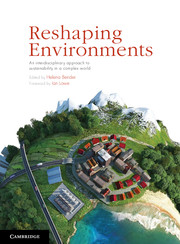Book contents
- Frontmatter
- Contents
- Contributors
- Acknowledgements
- Introduction Reshaping environments – an opportunity for envisioning the future
- Part 1 Cases
- Part 2 Skills
- 9 Critique, analysis and reflection in the study of reshaping environments
- 10 Working with complex issues in group situations
- 11 Understanding research methodology
- 12 An interdisciplinary approach
- Part 3 Theory
- Index
- Plate Section
- References
9 - Critique, analysis and reflection in the study of reshaping environments
from Part 2 - Skills
Published online by Cambridge University Press: 05 February 2013
- Frontmatter
- Contents
- Contributors
- Acknowledgements
- Introduction Reshaping environments – an opportunity for envisioning the future
- Part 1 Cases
- Part 2 Skills
- 9 Critique, analysis and reflection in the study of reshaping environments
- 10 Working with complex issues in group situations
- 11 Understanding research methodology
- 12 An interdisciplinary approach
- Part 3 Theory
- Index
- Plate Section
- References
Summary
Introduction
This chapter aims to make explicit some of the thinking and learning skills necessary to build an understanding of human–environment interactions, sustainability and other complex concepts encountered in this text. Studying the shaping and reshaping of environments involves analysing and synthesising information stemming from a variety of disciplinary perspectives, presented in different forms and at different scales. To do this requires active work to develop sophisticated skills in critical thinking, analysis and reflection, thereby building a capacity for deep learning (Wharburton 2003).
Students are often unsure what is meant by critical and reflective thinking. They ask for examples; they want to know ‘how it’s done’ and how to build their skills. Thus this chapter takes the form of questions and answers based on typical student queries. It briefly outlines the principles underlying critical thinking and reflection, providing activities and exercises to assist in developing these skills. It uses examples from the case studies and ideas presented in this book, and also samples of student writing, to illustrate key concepts. Ultimately, it aims to equip students with some essential tools for becoming more critical, analytical and reflective thinkers, better able to meet the ‘wicked’ present-day challenges of climate change and environmental degradation.
- Type
- Chapter
- Information
- Reshaping EnvironmentsAn Interdisciplinary Approach to Sustainability in a Complex World, pp. 209 - 226Publisher: Cambridge University PressPrint publication year: 2012
References
- 2
- Cited by



